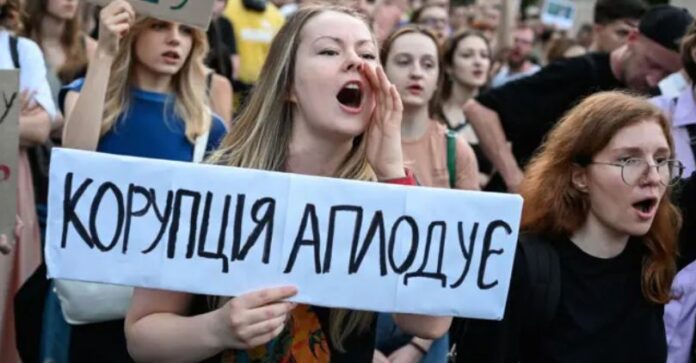Ukraine’s fragile wartime democracy is facing one of its most significant internal tests as massive protests break out across the country following President Volodymyr Zelensky’s signing of a controversial bill that critics say threatens the independence of anti-corruption institutions.
On July 22, the Ukrainian Parliament passed legislation that subordinates the National Anti-Corruption Bureau (NABU) and the Specialized Anti-Corruption Prosecutor’s Office (SAPO) to the prosecutor general’s office—a post appointed directly by the president. By July 23, demonstrators filled the streets of Kyiv, Lviv, Dnipro, and Odesa, calling the move a betrayal of Ukraine’s post-2014 reform legacy and a dangerous step toward executive overreach.
“This is not what we fought for on the Maidan,” shouted a protester in Kyiv’s Independence Square, invoking the 2014 uprising that toppled a pro-Kremlin regime and initiated sweeping reforms. “We’re not going back to the days when one man could decide everything.”
The bill’s passage and rapid signing by Zelensky caught many off guard, including members of Ukraine’s civil society who had supported the president during wartime. The legislation was approved with minimal debate, and activists criticized the process as opaque and rushed—particularly given its far-reaching implications.
Under the new law, the independence of NABU and SAPO—which were created with significant backing from the European Union and international organizations—will be severely curtailed. These institutions have led high-profile investigations into oligarchs, politicians, and state corruption schemes over the past decade. Critics warn that putting them under the oversight of the prosecutor general undermines their ability to act without political pressure.
Zelensky defended the move in a televised address, arguing that wartime circumstances required greater coordination between law enforcement agencies and that delays in prosecuting major corruption cases were “unacceptable.” He insisted that the new structure would “ensure justice is delivered swiftly and without interference,” and accused critics of “politicizing a necessary reform.”
Still, the backlash has been fierce—and not only from within Ukraine. European Commission officials and G7 diplomats expressed “deep concern” that the legislation contradicts Ukraine’s commitments to independent justice and good governance. EU leaders warned that the law could complicate Ukraine’s path toward membership and may trigger a review of financial assistance agreements.
Transparency International, a leading global anti-corruption watchdog, called the law “a regression” and warned that it “jeopardizes years of institutional progress and international credibility.” Ukrainian anti-corruption activists echoed that sentiment. “This is not about reform; this is about control,” said Tetiana Shevchuk, a legal expert at the Anti-Corruption Action Center.
The political fallout is already beginning to emerge. Some members of Zelensky’s own Servant of the People party reportedly voiced misgivings in private, and the law has reignited criticism of the growing influence of presidential chief of staff Andriy Yermak, often described as one of the most powerful unelected figures in the country.
The protests—which have been largely peaceful—represent a significant act of civic resistance under martial law. Although public gatherings have been restricted since the start of Russia’s full-scale invasion in 2022, the scale of these demonstrations underscores the intensity of public opposition.
War veterans, students, civic leaders, and ordinary citizens marched side by side, chanting “No to dictatorship” and “Corruption kills more than missiles.” In Lviv, veterans of the Azov Battalion stood in front of city hall holding signs that read: “We defended Ukraine from Russia—now we must defend it from ourselves.”
Though Zelensky remains popular for his wartime leadership, analysts say his administration risks alienating the very groups that have upheld Ukrainian democratic identity. “The government is navigating a dangerous line between wartime necessity and democratic erosion,” said political analyst Oleksiy Haran. “This law crosses it.”
International pressure is mounting. EU Commission President Ursula von der Leyen reportedly requested an urgent call with Zelensky, and foreign aid donors are reviewing Ukraine’s compliance with governance benchmarks. Ukraine’s allies face a difficult balancing act: continuing to support Kyiv against Russian aggression while insisting on democratic accountability.
Domestically, civil society groups are organizing a legal challenge to the bill, and some lawmakers have vowed to push for a presidential veto—though that appears unlikely. Zelensky has promised to monitor the implementation closely and invited stakeholders to propose amendments if unintended consequences arise.
Whether the government reverses course or pushes forward, the controversy has exposed growing tensions within Ukraine’s wartime political system. At its heart is a critical question: Can Ukraine maintain democratic institutions while fighting for survival on the battlefield?
For many Ukrainians, the answer must be yes.

